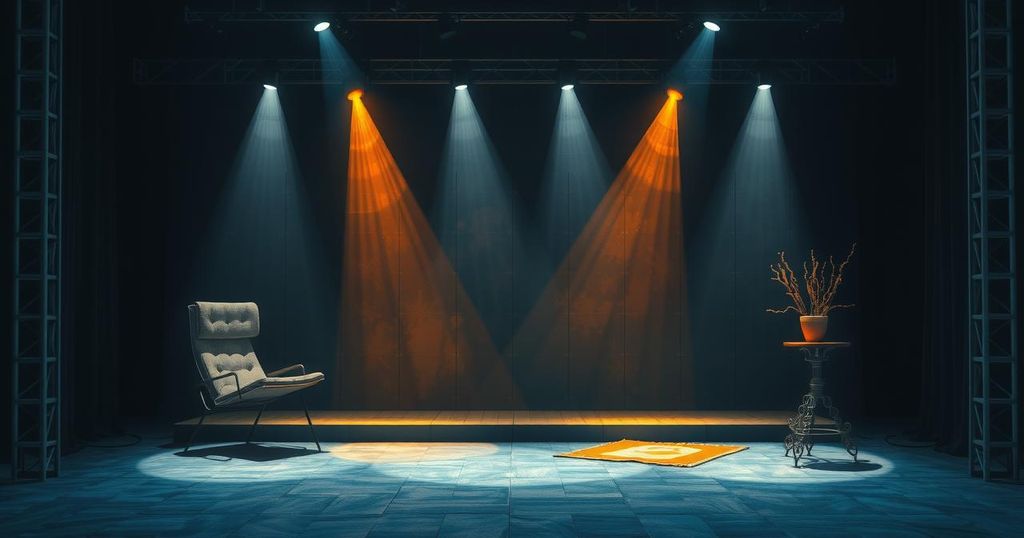Lebanon’s Theaters Resurge Amidst War’s Echoes and Economic Struggles
Lebanon’s theater scene is reawakening following its recent war, with plays like Ali Chahrour’s ‘When I Saw the Sea’ and Fatima Bazzi’s ‘Suffocated’ addressing the plight of migrant workers and the scars of conflict. Artists are using their experiences to portray issues of displacement and resilience, seeking to revive cultural dialogue amid an ongoing economic crisis.
In the wake of a recent ceasefire ending the intense conflict between Israel and Hezbollah, Lebanon’s theater scene is regaining momentum, thanks to the relentless spirit of its artists. One such artist, playwright and choreographer Ali Chahrour, revealed his latest creation, a performance that highlights the challenging lives of migrant workers affected by the conflict. Chahrour’s project, which premiered in Beirut earlier this month, aims to traverse stages across Europe, including the prestigious Avignon Festival in France.
Sitting down for a discussion about his work, Chahrour expressed how his art flourished amid turmoil. “This project was born during the war. I did not want to stop making theatre, because I don’t know how to fight or carry weapons; I only know how to dance.” His performance, titled “When I Saw the Sea,” features the voices of two Ethiopian domestic workers and a Lebanese Ethiopian woman, who narrate stories of exile and abuse, paying homage to migrant women who endured incredible hardships during the two-month war.
Chahrour recounted how hundreds of migrant workers took refuge in NGO-run shelters as they sought safety from the Israeli bombardments. Many were left homeless and abandoned by their employers in a volatile landscape. He noted that meeting these women during the conflict inspired him immensely. “Meeting with these women gave me the strength and energy to keep going during the war,” he remarked, emphasizing the need to bring their stories into the light amidst Lebanon’s ongoing struggle to treat migrant workers fairly.
Another artist, Fatima Bazzi, has also used her experiences to shape her latest production. Her play, “Suffocated,” was born from her own upheaval as she was forced to leave her home during the bombardment in southern Beirut. Originally centered on the theme of domestic strife, Bazzi found herself weaving elements of her escape into the narrative after she temporarily relocated to Iraq.
Despite the distance, Bazzi maintained communication with her cast, which eventually translated into the performance itself. “We took advantage of this in the performance, the idea of separation and distance,” she explained. A powerful moment in the play occurs when the sound of a bomb interrupts the characters, leading them to check their phones, thereby transforming their reactions into part of the performance.
The struggles of Lebanon’s theater industry extend beyond the trauma of war. Omar Abi Azar, founder of the Zoukak collective, which hosted Bazzi’s piece, reflected on the profound impacts the ongoing economic crisis has had on local arts. “We postponed an entire festival at the end of last year due to the war,” he stated.
Yet, there is a flicker of hope as productions tentatively restart. For Abi Azar, his own piece, “Stop Calling Beirut,” delves into childhood memories shaped by previous conflicts, asserting resilience in the face of adversity. “We are children of war. We were born, raised, and grew up in the heart of these crises,” he shared poignantly.
Ultimately, these individuals demonstrate that through the lens of artistic creation, adversity can transform into powerful narratives that echo the resilience of a society often overshadowed by the remnants of war and economic despair.
Despite the turmoil and ongoing economic challenges, Lebanese theater artists like Ali Chahrour and Fatima Bazzi exemplify resilience by channeling their experiences and the shared struggles of migrant workers into impactful performances. This vibrant revival of Lebanon’s theater scene not only offers a platform for marginalized voices but also acts as a form of collective healing. Through art, these creators aim to shed light on difficult truths while continuing to engage audiences both locally and internationally, signaling hope amid strife.
Original Source: www.france24.com




Post Comment